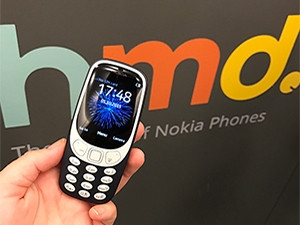
Did you hear the news? It would have been hard not to. The announcement of a new Nokia 3310 made headlines everywhere. Yes, the legend is back!
Well, legend for some. If I recall correctly, I really loved the 6210 instead. But by 'legend', what everyone actually yearns for is Nokia itself. The 3310 is just a symbol of a brand that, if you owned a mobile phone around the start of the new millennium, you would share a connection with.
Since the announcement, reality started to set in. Technology sites published updates or released additional articles, dampening their original enthusiasm. The new 3310 truly is a resurrection of the original phone, in that it's a feature phone. No WiFi, no 3G, no Android nor Windows, so no apps.
Yet it is also not a resurrection. This phone was brought to life by HMD, a Finnish company seemingly filled with mobile industry people, and Foxconn, maker of nearly all you can survey in your gadget kingdom.
The pair paid $350 million to Microsoft for the brand licensing rights, Microsoft previously having bought Nokia for over $7 billion in what is now considered an epic acquisition blunder. So, very little of the Nokia essence is in this phone.
On the upside, it does claim 22 hours talk time and a month on standby.
The local representatives of HMD were helpful and quick to provide answers to my questions. HMD explained its rationale: 2G is still popular in Africa, many people might want a secondary device, the battery life is excellent and it will support Facebook Messenger in lieu of WhatsApp and other popular messaging clients.
But even if all that adds up, it should at least have WiFi, and it's speculated R700 is more expensive than the R499 for SA's cheapest smartphone. Had it WiFi and WhatsApp, we may have been talking about a real bridge for the digital divide.
Had it WiFi and WhatsApp, we may have been talking about a real bridge for the digital divide.
Nonetheless, the 3310 will likely do well in the feature phone segment. Nokia apparently sold 35 million such devices in 2016, second to Samsung's 52 million feature phone sales. But Sammy sells five to six times as many smartphones. So even if the 3310 is a big fish, that pond is small. Hardly worthy of the boisterous hallelujahs celebrating its return.
But the best of luck to the 3310. I'm willing to bet it will grow Nokia's feature phone market share. It may even attract attention to HMD's Android-powered Nokia-branded smartphones.

The real revelation is just how dismal the mobile industry has become. Two years ago, I was lucky enough to visit the Mobile World Congress (MWC). It was a fun and insightful trip, but also somewhat monotone. I would walk to a company's phones and take a look. Then I'd have to look up at the stand signage to see which brand's phones I was looking at. They all seemed the same.
MWC 2016 was equally uneventful. The biggest deal was the photo of Mark Zuckerberg strolling past an audience of oblivious virtual reality users. Some features, such as fingerprint readers, were permeating while other ideas disappeared or clung to the edges.
At MWC 2017, there was at least one device still plying the abandoned trend for modular phones. The big brands are dangling 4K screens instead. In such a lacklustre display, it's easy to see how the 3310 took the headlines.
I am no fan of the iPhone AirPods, which helped do away with the iPhone 7's headphone jack. I think it's a ridiculous way to innovate by fixing what isn't broken. Yet up to this point I also thought it the sour grapes of a technology cynic.
But if a feature phone ? even an iconic one ? can make bigger headlines than the supercomputers in our pockets... that's a pretty sad state of affairs, isn't it?
* James Francis is a freelance writer whose work has appeared in several local and international publications.
Share